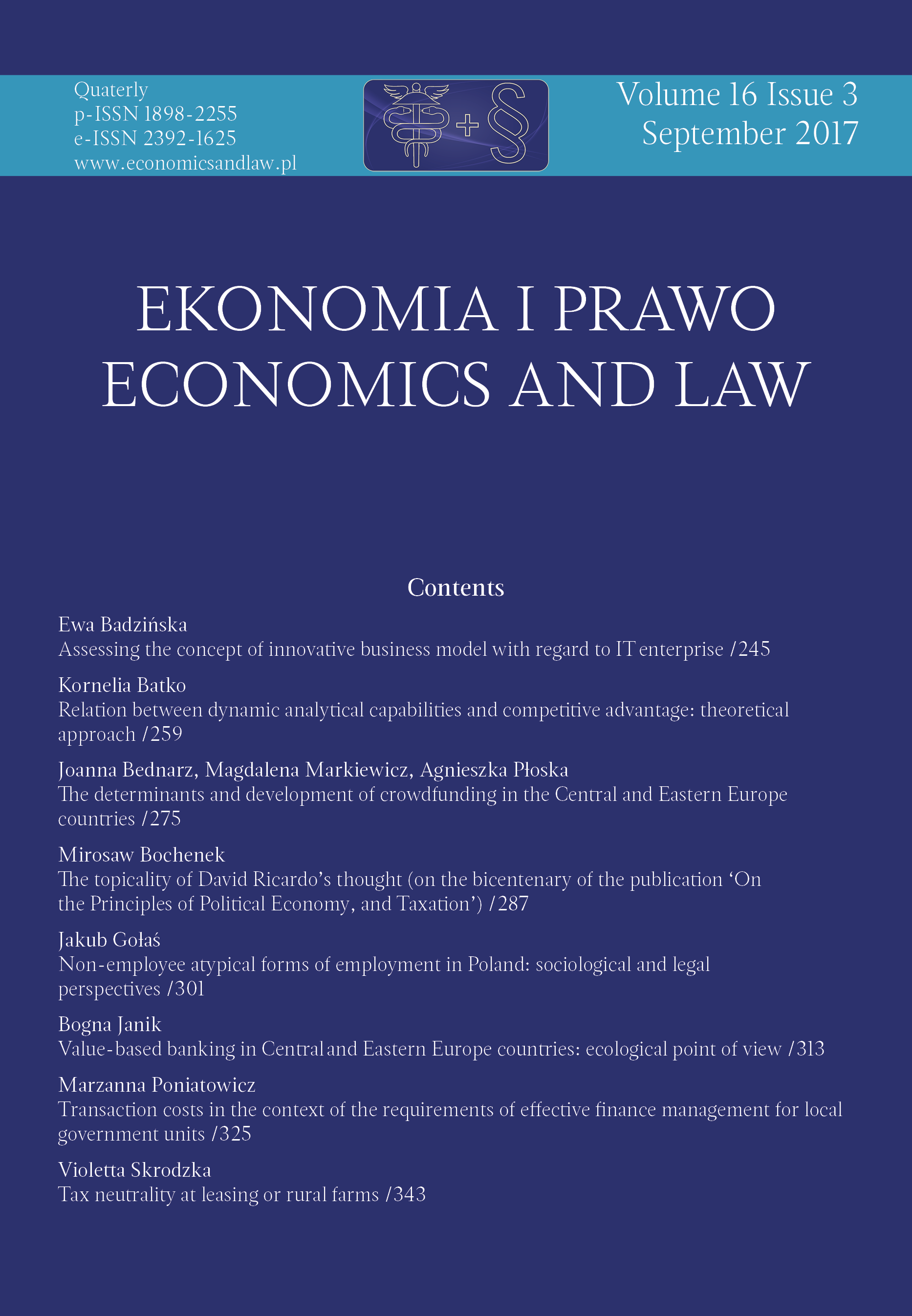Non-employee atypical forms of employment in Poland: sociological and legal perspectives
DOI:
https://doi.org/10.12775/EiP.2017.021Keywords
atypical forms of employment, non-employee, self-employment, civil law contractsAbstract
Motivation: The latest statistical data coming from the Central Statistical Office of Poland reports allows to conduct first estimative study concerning scale and structure of work undertaken in non-employee atypical forms of employment in Poland. Self-employment and work performed under private (civil-law) contracts are often associated with issue of the so-called junk contracts. In this respect, particular role should be assigned to the national legislator who can impose effective regulations designed to combat abusive practices in the field of atypical forms in employment.
Aim: The purpose of the article is to present scale and structure of work undertaken in non-employee atypical forms of employment in Poland and to characterize domestic legal frameworks defining acceptable limits of applying such forms of employment.
Results: Approximately 17% of working population in Poland is employed under non-employee atypical forms. The levels of such forms of employment have been stable in recent years. The problem arises when such forms of employment are imposed on workers against their free will. The data suggests that on the average in 7 out of 10 registered cases non-employee forms of employment were imposed by an employer. Domestic regulations establish theoretically appropriate legal measures designed to reduce apparent abuse of such forms of employment. However, the main problem lies in both the difficulty to properly classify individual cases and the effectiveness of applying particular measures in practice.
References
Bąk, E. (2009). Nietypowe formy zatrudnienia na rynku pracy. Warszawa: C.H. Beck.
Bąk-Grabkowska, D. (2012). Atypical forms of work arrangements and forms of em-ployment as a determinant of working time arrangements. Paper presented at 13 th Management International Conference, Budapest, Hungary. Retrieved 25.01.2017 from http://www.fm-kp.si.
Berezka, A. (2012). Nietypowe formy zatrudnienia w Polsce na tle wybranych krajów Unii Europejskiej. Studia i Prace Wydziału Nauk Ekonomicznych i Zarządzenia, 28.
Chobot, A. (1997). Nowe formy zatrudnienia. Kierunki rozwoju i nowelizacji. War-szawa: PWN.
Gersdorf, M. (2012). Kodeks zatrudnienia wyzwaniem przyszłości. In M. Gersdorf (Ed.), Zatrudnieni i zatrudniający na aktualnym rynku pracy. Warszawa: Lex-isNexis.
GUS. (2014a). Monitoring rynku pracy. Retrieved 25.01.2017 from http://stat.gov.pl.
GUS. (2014b). Rocznik statystyczny pracy 2012. Retrieved 25.01.2017 from http://stat.gov.pl.
GUS. (2015a). Wybrane zagadnienia rynku pracy. Dane za 2013 rok. Retrieved 25.01.2017 from http://stat.gov.pl.
GUS. (2015b). Wybrane zagadnienia rynku pracy. Dane za 2014 rok. Retrieved 25.01.2017 from http://stat.gov.pl.
GUS. (2016a). Pracujący w nietypowych formach zatrudnienia. Retrieved 25.01.2017 from http://stat.gov.pl.
GUS. (2016b). Rocznik statystyczny pracy 2015. Retrieved 25.01.2017 from http://stat.gov.pl.
GUS. (2017). Wybrane zagadnienia rynku pracy. Dane za 2015 rok. Retrieved 25.01.2017 from: http://stat.gov.pl.
ILO. (2015). Non-standard forms of employment. Retrevied 25.01.2017 from http://www.ilo.org.
Jaśkowski, K. & Maniewska, E. (2016). Komentarz aktualizowany do ustawy z dnia 26 czerwca 1974 r. Kodeks pracy. Ustawy towarzyszące z orzecznictwem. Europejskie prawo pracy z orzecznictwem. Warszawa: LEX/el.
Judgement of the Supreme Court of 14 September 1998 (I PKN 334/98) (Poland).
Judgement of the Supreme Court of 18 June 1998 (I PKN 191/98) (Poland).
Judgement of the Supreme Court of 2 September 1998 (I PKN 293/98) (Poland).
Judgement of the Supreme Court of 26 November 1998 (I PKN 458/98) (Poland).
Judgement of the Supreme Court of 28 October 1998 (I PKN 416/98) (Poland).
Judgement of the Supreme Court of 5 May 2010 (I PK 8/10) (Poland).
Judgement of the Supreme Court of 7 April 1999 (I PKN 642/98) (Poland).
Liptak, K. (2011). Is atypical typical? Atypical employment in Central Eastern European countries. Employment and Economy in Central and Eastern Europe, 1.
Ogura, K. (2005). International comparison of atypical employment: differing concepts and realities in industrialized countries. Japan Labor Review, 2.
Ustawa z dnia 17 listopada 1964 r. Kodeks postępowania cywilnego [Civil Procedure Code of 17 November 1964] (Dz.U. 2016 poz. 1822) (Poland).
Ustawa z dnia 26 czerwca 1974 r. Kodeks pracy [Labour Code of June 26, 1974] (Dz.U. 2016 nr 0 poz. 1666) (Poland).
Downloads
Published
How to Cite
Issue
Section
Stats
Number of views and downloads: 389
Number of citations: 0
